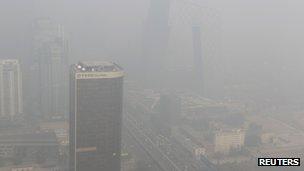UN warns Chinese pollution has dire health implications
- Published

Beijing was enveloped by a blanket of smog as Achim Steiner spoke
Chinese people are paying for the country's heavy pollution with their health, the head of the UN Environment Programme says.
Achim Steiner said hundreds of thousands of people were affected by premature death and respiratory illnesses because of poor air quality.
But the government is planning policies that could result in a cleaner, greener China, he added.
Mr Steiner is in Beijing to launch a "green economy" report.
The document, which has taken three years to prepare, outlines how countries can maintain economic growth and improve the environment at the same time.
Mr Steiner, executive director of the UN Environment Programme (UNEP), praised China's approach on this issue.
It is now the world's biggest investor - spending $49bn (£31bn) last year - on renewable energy, a figure that will grow over the next five years.
But in one respect the UNEP chose a bad day to trumpet China's green credentials: Beijing was covered with a blanket of smog.
The city authorities said the air was only "slightly polluted", but at least one Chinese official believes this monitoring system is "rather lax".
The US embassy in Beijing, which measures air pollution in the Chinese capital using a stricter standard, said the pollution was "hazardous" at some points on Wednesday.
Addressing the issue of pollution, Mr Steiner said there were costs associated with the "let's develop and clean up later approach to development" China has employed over the last three decades.
"They are paying a price first of all individually by premature deaths… Respiratory diseases and premature deaths in the hundreds of thousands," he said.
"China as a society also pays a heavy price in terms of healthcare and lost productivity."
The UNEP report, entitled Towards a Greener Future, suggests that for an investment equivalent to 2% of global GDP the world could start creating sustainable and environmentally friendly economies.
Mr Steiner gave the example of water heaters powered by solar panels, which are costly to install, but eventually lead to savings in both money and energy.
- Published7 November 2011
- Published15 June 2011
- Published28 February 2011
- Published25 November 2010